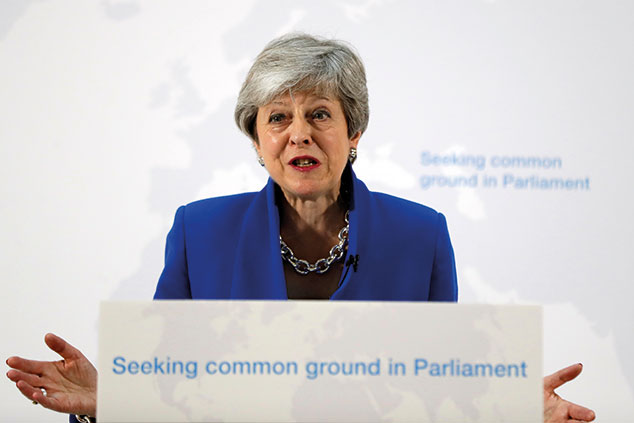
Theresa May “made her final big gamble” as prime minister on Tuesday, offering Labour a “new deal” that included the possibility of a second EU referendum, say Laura Hughes, George Parker and Sebastian Payne in the Financial Times.
However, her ten-point plan, aimed at cross-party consensus, was “declared dead on arrival” by angry Conservative eurosceptics, and Labour leader Jeremy Corbyn called it a “repackaging of the same old bad deal”. MPs are due to vote on May’s new offer in the first week of June, but the vote has not been confirmed and some Tory MPs are calling for May to stand down “rather than risk another humiliation in the House of Commons”.
Going down like a lead balloon
May’s “package of concessions” includes a commitment to conclude alternative arrangements to replace the Irish backstop by December 2020, “so that it never needs to be used”, and a parliamentary vote on whether the deal should be subject to a referendum, say Henry Zeffman and Oliver Wright in The Times. The new deal also leaves Britain, in effect, as a “rule-taker from Brussels on workers’ rights, the environment, goods and foodstuffs”, says the FT.
No wonder it went down like a lead balloon, says Harry Yorke in The Daily Telegraph – 26 Conservative MPs who backed the deal in March, including Boris Johnson, Dominic Raab, David Davis, Iain Duncan Smith and Jacob Rees-Mogg, said they would “switch back to opposing it”, while sources close to the 20-strong group of Labour MPs in Leave-voting seats have “indicated that only a handful will switch sides”. The DUP and Labour confirmed they will reject it.
“By adding the opportunity for a second referendum [and] a customs union, and by threatening that she will stop her successor from reversing anything by implementing binding legislation, this was perhaps the greatest hijacking of the referendum yet seen,” says Iain Duncan Smith in The Daily Telegraph, who can think of “no more effective way” of encouraging voters to desert the Conservatives and vote for the Brexit Party in the European elections.
The Brexit confusion means that these elections, which historically have low turnouts, “stand to be consequential”, says Yasmeen Serhan in The Atlantic. They will provide a “snapshot of where the public stands on Brexit” three years on from the referendum, and perhaps most importantly, “signal which voters are most mobilised to turn out in future elections”.
Whatever happens, we can be “pretty sure” that Theresa May is on her way out, says James Blitz in the Financial Times. Assuming she departs without a deal, this – along with what looks to be a “thumping victory” by the Brexit Party in the European elections – will define the nature of the Tory leadership contest. May’s failure will suit those like Johnson who want to “ram home a harder, cleaner Brexit”, splitting the party and the country. The idea that a clean, no-deal Brexit would “work out just fine because of the provisions of the World Trade Organisation (WTO) treaty” simply isn’t true, say Anand Menon and Catherine Barnard in The Guardian.
If Britain leaves without a deal, many of the laws that govern our interaction with the EU will simply “cease to apply”. This will “mean significant problems”, particularly relating to travel and trade, including potentially “crippling” tariffs and border delays. “No other major trading nation trades purely on WTO terms.” To take just one example, 750 UK-based TV channels will have to stop broadcasting in Europe or move there. The “no-deal slogan is appealing in its simplicity”, but its supporters should be honest about the consequences.
Europe’s cohesion “is under siege”, says Bloomberg. Populist groups anticipate “sizable gains” in this week’s European elections, “giving them more power than ever before” over the institutions at the heart of the EU. Although the “Brexit fiasco” has lessened the appeal of leaving the EU (60% of Europeans believe membership is a good thing), populists want to “undermine it from within”, halting the push for greater integration, curtailing the authority of Brussels and limiting the EU’s ability to insist on adherence to “democratic norms”.
While it is true that Brussels is “prone to regulatory excess and plagued by a lack of popular legitimacy”, its flaws “pale in comparison to the dangers posed by its critics”. Left unchecked, the contagion of populism will “corrode Europe’s identity as a democratic union” and “weaken Europe’s influence abroad”.
As it stands, these elections are set to create the most “fragmented and fractious European parliament” in history, say Patrick Scott and Ashley Kirk in The Daily Telegraph. The two largest groups, the centre-right European People’s Party and centre-left Socialists & Democrats, are expected to “shed support”, while eurosceptic parties, notes Romesh Ratnesar on Bloomberg, are “on track to win more than one third of the seats”, forming a unified voting bloc with real clout.
At both national and pan-European levels, leaders need to understand what is fuelling populism – a “cacophonous” landscape that is ideologically and demographically diverse – and come up with “concrete solutions”, says Bloomberg. Above all, this means expanding economic opportunity for the poor, reforming Europe’s immigration system and making EU institutions more accountable. This won’t be easy and it won’t happen overnight, “but for the sake of Europe’s future, it needs to start now”.